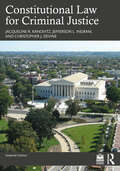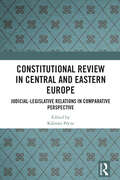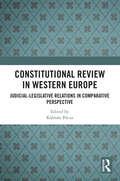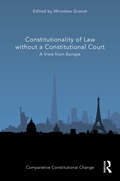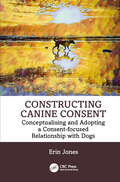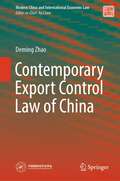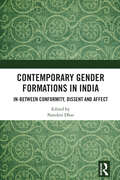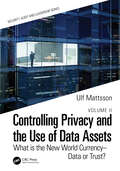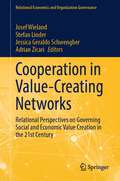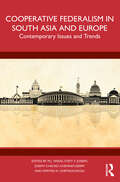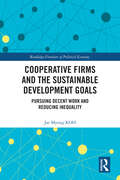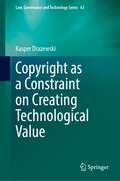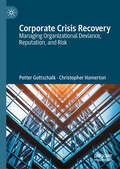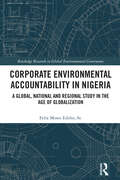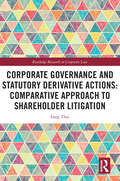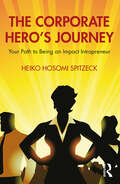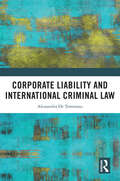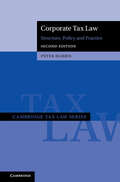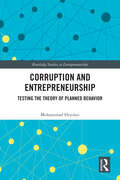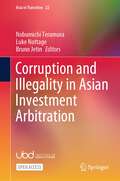- Table View
- List View
Constitutional Law for Criminal Justice
by Jacqueline R. Kanovitz Jefferson L. Ingram Christopher J. DevineConstitutional Law for Criminal Justice, Sixteenth Edition, offers criminal justice professionals the training they need to recognize the constitutional principles that apply to their daily work. Jacqueline R. Kanovitz, Jefferson L. Ingram, and Christopher J. Devine provide a comprehensive, well-organized, and up-to-date analysis of constitutional issues that affect the U.S. justice system. Chapter 1 of Part I summarizes the organization and content of the Constitution, the Bill of Rights, and the Fourteenth Amendment. The next eight chapters cover the constitutional principles that regulate investigatory detentions, traffic stops, arrests, use of force, search and seizure, technologically assisted surveillance, the Wiretap Act, interrogations and confessions, self-incrimination, witness identification procedures, the right to counsel, procedural safeguards during criminal trials, First Amendment issues relevant to law enforcement, and capital punishment. The final chapter covers the constitutional rights of criminal justice professionals in the workplace, their protection under Title VII of the Civil Rights Act, and their accountability under 42 U.S.C. § 1983 for violating the constitutional rights of others. Part II contains abstracts of key judicial decisions exemplifying how the doctrines covered in earlier chapters are being applied by the courts. The combination of text and cases creates flexibility in structuring class time. This book makes complex concepts accessible to students in all levels of criminal justice education. The chapters begin with an outline and end with a summary. Key Terms and Concepts are defined in the Glossary. Tables, figures, and charts are used to synthesize and simplify information. The result is an incomparably clear, student-friendly textbook that has remained a leader in criminal justice education for more than 50 years. The accompanying Instructor and Student Resources website provides free digital materials designed to test student knowledge and save time when preparing lessons. Resources include: Student access to practical quizzes including multiple-choice and true-or-false questions, and case studies with interactive questions and answers to test and apply knowledge A downloadable comprehensive study guide, glossary, and appendix including the text of the United States Constitution to enhance understanding of each chapter alongside study Step-by-step Instructor Guides and premade lesson slides that correspond to the chapters in an editable format to saving valuable time on lesson preparation Instructor access to test-bank questions for further exam practice
Constitutional Review in Central and Eastern Europe: Judicial-Legislative Relations in Comparative Perspective
by Kálmán PóczaRecent confrontations between constitutional courts and parliamentary majorities in several European countries have attracted international interest in the relationship between the judiciary and the legislature. Some political actors have argued that courts have assumed too much power and politics has been extremely judicialized. This volume accurately and systematically examines the extent to which this aggregation of power may have constrained the dominant political actors’ room for manoeuvre. To explore the diversity and measure the strength of judicial decisions, the contributors to this work have elaborated a methodology to give a more nuanced picture of the practice of constitutional adjudication in Central and Eastern Europe between 1990 and 2020. The work opens with an assessment of the existing literature on empirical analysis of judicial decisions with a special focus on the Central and Eastern European region, and a short summary of the methodology of the project. This is followed by ten country studies and a concluding chapter providing a comprehensive comparative analysis of the results. A further nine countries are explored in the counterpart volume to this book: Constitutional Review in Western Europe: Judicial-Legislative Relations in Comparative Perspective. The collection will be an invaluable resource for those working in the areas of empirical legal research and comparative constitutional law, as well as political scientists interested in judicial politics.
Constitutional Review in Western Europe: Judicial-Legislative Relations in Comparative Perspective
by Kálmán PóczaRecent confrontations between constitutional courts and parliamentary majorities in several European countries have attracted international interest in the relationship between the judiciary and the legislature.Some political actors have argued that courts have assumed too much power and politics has been extremely judicialized. Yet the extent to which this aggregation of power may have constrained the dominant political actors’ room for manoeuvre has never been examined accurately and systematically. This volume fills this gap in the literature. To explore the diversity and measure the strength of judicial decisions, the authors have elaborated a new methodology that is intended to give a more nuanced picture of the practice of constitutional adjudication in Europe. The work opens with an assessment of the existing literature on empirical analysis of judicial decisions with a special focus on Western Europe and a short summary of the methodology of the project. This is followed by 11 country studies and a concluding chapter providing a comprehensive comparative analysis of the results. A further ten countries are explored in the counterpart volume to this book: Constitutional Review in Central and Eastern Europe: Judicial-Legislative Relations in Comparative Perspective.The collection will be an invaluable resource for those working in the areas of empirical legal research and comparative constitutional law, as well as political scientists interested in judicial politics.
Constitutionality of Law without a Constitutional Court: A View from Europe (Comparative Constitutional Change)
by Mirosław GranatThis book analyses the problem of the possibility of guaranteeing the constitutionality of law in cases when a constitutional court either has been weakened or does not exist. A starting point of the research is the emergence of the so-called illiberal constitutionalism in several states, namely Poland, Hungary and Turkey, as this phenomenon gravely affects the functioning of constitutional courts. The work is divided into three parts. The first contains contributions of a theoretical nature dedicated to the current shape of constitutional review, in particular in the light of the emergence of "illiberal constitutionalism". This part of the book also deals with the collapse of the centralised constitutional review in Poland and the attempts to resolve the constitutional crisis. The second is focused on discussing specific, current problems with constitutional review, on the basis of states such as Hungary, Romania, Turkey and Poland. The third relates to other forms of constitutional review, that is, the so-called dispersed model and the parliamentary one executed in the course of the legislative process. The contributions discuss such forms of constitutional review in the Netherlands and Finland. The book will be a valuable resource for students, academics and policy-makers working in the areas of constitutional law and politics.
Constructing Canine Consent: Conceptualising and adopting a consent-focused relationship with dogs
by Erin JonesThe concept of canine consent is far more than simply a buzzword in modern dog training practices. In its current form, consent is a distinctly human concept, designed by humans and for humans. Looking beyond species boundaries can help us not only consider concepts of canine consent and autonomy, but it can also help us to apply these concepts in our everyday interactions with dogs, which is fundamental for any professional working with dogs as well as for everyday dog caregivers. This canine-indexed definition of consent includes a model of five major categories: Touch/interaction-based consent, cooperative care using learned consent behaviours, activity consent, consent-based learning, and substitutive consent. These categories involve a two-way communication system, integration of salient choices, teaching consent behaviours and incorporating existing training protocols that adhere to the Humane Hierarchy of best practices, and an evaluation of dependent decision-making in extenuating circumstances. This book aims to merge the existing literature and new understandings about canine consent to paint a complete picture. It will challenge the current expectations of dogs and dog behaviour in our society with an intention of considering their perspectives, experiences, and emotional needs. It will be important reading for veterinary professionals, dog trainers and behaviourists, those involved in work with therapy dogs, and anybody working with or caring for dogs.
Constructive Side-Channel Analysis and Secure Design: 15th International Workshop, COSADE 2024, Gardanne, France, April 9–10, 2024, Proceedings (Lecture Notes in Computer Science #14595)
by Romain WacquezThis book constitutes the refereed proceedings of the 15th International Workshop on Constructive Side-Channel Analysis and Secure Design, COSADE 2024, held in Gardanne, France, during April 9–10, 2024. The 14 full papers included in this book were carefully reviewed and selected from 42 submissions. They were organized in topical sections as follows: Analyses and Tools; Attack Methods; Deep-Learning-Based Side-Channel Attacks; PUF/RNG; and Cryptographic Implementations.
Contemporary Challenges in Clinical Legal Education: Role, Function and Future Directions (Legal Pedagogy)
by Matthew Atkinson Ben LivingsThis edited book addresses contemporary challenges in clinical legal education (CLE), considering its role in legal education and in the broader community it serves. Written by experts from various international contexts, the book explores how the changing nature and requirements of legal practice alongside social and technological developments affect the pedagogy of clinical legal education. Chapters chart the development of clinical legal education across various jurisdictions and examine developments in programme design and supervision of and in CLE along with the role of CLE in the community. The authors also reflect on the dynamic and developing role of clinical legal education and offer recommendations for the future. This book will be essential reading for academics, researchers in clinical legal education, and those interested in legal education across the world. It will also be of interest to students of clinical legal education whose research requires a deeper understanding of the current themes and issues of the subject.
Contemporary Export Control Law of China (Modern China and International Economic Law)
by Deming ZhaoThis book gives practical and in-depth presentation and analysis of the issues under China export control law and economic sanctions regime. This book not only addresses issues faced by the legal entities in China, but also attends to the concerns about Chinese extra-territorial jurisdiction of China export control law and sanctions legislations, on the part of foreign companies. Finally, the author shares his experiences on how to structure export control and sanctions compliance under Chinese law on the part of both Chinese and foreign companies.
Contemporary Gender Formations in India: In-between Conformity, Dissent and Affect
by Nandini DharThe volume discusses critical issues surrounding the developments in gender movements in the last two decades in India following the Delhi rape case and the ensuing massive protests in December 2012. A critical documentation of some of the key moments surrounding the contemporary gendered formations and radicalisms in South Asia, the chapters span questions of class, caste, sexuality, digital feminisms, and conflict zones. The book looks at anger, protest, and imaginations of resistance. It showcases the ‘new’ visibility that digital spaces have opened up to lend voice to survivors who are let down by traditional justice mechanisms and raises questions regarding ‘individualized’ modes of seeking justice as against traditional ‘collective’ voices that have always been a hallmark of movements. The volume analyses and criticizes the complicity of the state and the court as agents of reinforcing gender violence – an issue that has not been theorized enough by activists and scholars of violence. Further, it also delves into the #MeToo movement and the LoSHA, as both have raised contentious, controversial, and often conflicting debates on the nature of addressing sexual harassment, particularly at the workplace. Calling for further debate and discussions of cyberspace, gender justice, sexual violence, male entitlement, and forms of neoliberal feminism, this volume will be of immense interest to scholars and researchers in the areas of women and gender studies, sociology and social theory, gender politics, political theory, democracy, protest movements, politics, media and the internet, political advocacy, and law and legal theory. It will also be a compelling read for anyone interested in gender justice and equal rights.
Controlling Privacy and the Use of Data Assets - Volume 2: What is the New World Currency – Data or Trust? (Security, Audit and Leadership Series)
by Ulf MattssonThe book will review how new and old privacy-preserving techniques can provide practical protection for data in transit, use, and rest. We will position techniques like Data Integrity and Ledger and will provide practical lessons in Data Integrity, Trust, and data’s business utility. Based on a good understanding of new and old technologies, emerging trends, and a broad experience from many projects in this domain, this book will provide a unique context about the WHY (requirements and drivers), WHAT (what to do), and HOW (how to implement), as well as reviewing the current state and major forces representing challenges or driving change, what you should be trying to achieve and how you can do it, including discussions of different options. We will also discuss WHERE (in systems) and WHEN (roadmap). Unlike other general or academic texts, this book is being written to offer practical general advice, outline actionable strategies, and include templates for immediate use. It contains diagrams needed to describe the topics and Use Cases and presents current real-world issues and technological mitigation strategies. The inclusion of the risks to both owners and custodians provides a strong case for why people should care. This book reflects the perspective of a Chief Technology Officer (CTO) and Chief Security Strategist (CSS). The Author has worked in and with startups and some of the largest organizations in the world, and this book is intended for board members, senior decision-makers, and global government policy officials—CISOs, CSOs, CPOs, CTOs, auditors, consultants, investors, and other people interested in data privacy and security. The Author also embeds a business perspective, answering the question of why this an important topic for the board, audit committee, and senior management regarding achieving business objectives, strategies, and goals and applying the risk appetite and tolerance. The focus is on Technical Visionary Leaders, including CTO, Chief Data Officer, Chief Privacy Officer, EVP/SVP/VP of Technology, Analytics, Data Architect, Chief Information Officer, EVP/SVP/VP of I.T., Chief Information Security Officer (CISO), Chief Risk Officer, Chief Compliance Officer, Chief Security Officer (CSO), EVP/SVP/VP of Security, Risk Compliance, and Governance. It can also be interesting reading for privacy regulators, especially those in developed nations with specialist privacy oversight agencies (government departments) across their jurisdictions (e.g., federal and state levels).
Cooperation in Value-Creating Networks: Relational Perspectives on Governing Social and Economic Value Creation in the 21st Century (Relational Economics and Organization Governance)
by Josef Wieland Stefan Linder Jessica Geraldo Schwengber Adrian ZicariThis volume embarks on a research journey that focuses on the processes of economic and social value creation in the 21st century. Given that value creation is increasingly organized in networks consisting of businesses, governments, academia, civil society, and other societal stakeholders, the contributions address various aspects of and challenges in governing cooperation in value-creating networks. Exploring topics such as relational rationality, cultural complexity, shared value creation, and relational contracts, this book reveals the mechanisms and processes involved in governing the complexities of inter-sectoral relationships in a networked society. Given its scope and focus, this book will appeal to scholars of economics, economic sociology, organizational studies, and related fields.
Cooperative Enterprises: Innovation, Resilience And Social Responsibility (Routledge Studies In Social Enterprise And Social Innovation Ser.)
by Piero AmmiratoCooperative Enterprises is the first textbook to examine the evolution of the cooperative enterprise model and the contribution that cooperatives can make to the economy and society.It provides an accessible overview of the subject, looking at history, cooperative models, theories, legislation, and governance. Cooperative Enterprises takes an international approach throughout, drawing on examples from cooperatives from across the globe. The book offers a valuable historical perspective, placing cooperatives within their political, social, cultural, and economic contexts since the Industrial Revolution. It analyses and compares the cooperative law of 26 jurisdictions and showcases key defining moments for cooperative enterprises, cooperative development models, cooperative‑specific good practice standards, and compares the cooperative model with the private enterprise model, giving readers a comprehensive view of the subject. The book also demonstrates that cooperatives correct the market, complement the role of the state, support local economic development, reduce income and wealth inequalities, promote social cohesion, and promote economic democracy. Students are supported with a range of pedagogical features, including case studies, tables, figures, chapter summaries, and discussion questions to encourage critical thinking.This is the ideal textbook for undergraduate and postgraduate courses on cooperative studies, and will also be an illuminating resource for students, researchers, and policymakers interested in social enterprise, business history, economic history, corporate governance, economic democracy, and community development.
Cooperative Federalism in South Asia and Europe: Contemporary Issues and Trends
by M. J. Vinod Stefy V. Joseph Joseph Chacko Chennatuserry Dimitris N. ChryssochoouThis book explores the challenges, opportunities, and trends impacting the working of federations in South Asia and Europe. It deliberates on the changing socio-economic realities, challenges facing the existing structures of governance, degrees of consociationalism, and the growing aspirations of people in South Asia and Europe. Through case studies from Greece, Germany, Austria, Switzerland, Spain, France, Sri Lanka, Pakistan, Nepal, Maldives, Bhutan, and India, the volume focuses on critical issues relating to cooperative federalism – its complexities, institutional dilemmas, and trends in South Asia and Europe. It discusses a variety of themes relevant to Cooperative Federalism including federal-state relations; cooperative governance; constitution; multiculturalism, fiscal relations, democratization, devolution of powers, consociationalism, and global citizenship in South Asia and Europe. The book further emphasizes the need to strike a balance between the federal government and the constituent units in these two regions. Topical and lucid, this book will be of interest to teachers, scholars, and researchers of political science, comparative government and politics, federalism, South Asian politics, European politics, governance studies, and political studies.
Cooperative Firms and the Sustainable Development Goals: Pursuing Decent Work and Reducing Inequality (Routledge Frontiers of Political Economy)
by Jae Myong KOHWith growing economic inequality and threats to the sustainability of human societies, Koh argues that cooperatives can play an important role in promoting decent work and reducing economic inequality in the twenty-first century and thus urges policy makers to reignite policy discussions on cooperatives. This book shows how worker cooperatives are uniquely situated to empower low- and middle-wage workers and what governments can do to promote them. Koh clarifies the mechanism by which cooperatives create an upper hand over conventional companies in ‘labor-intensive’ sectors, thereby boosting employment potential. He also explains cooperatives’ wide contribution to the Sustainable Development Goals (SDGs), including the resilience of cooperatives in times of crises and their potential to address the challenges of aging societies. Furthermore, he provides a foundational work on ‘decentralized supporting mechanisms for cooperatives’ based on the analysis of the case of South Korea, where the number of cooperatives increased by 2,000 percent between 2013 and 2023. Lastly, he explains how to use Official Development Assistance (ODA) to support cooperatives in developing countries, especially Private Sector Instruments (PSIs), which were introduced in 2016 by the Development Assistance Committee of the Organization for Economic Cooperation and Development (OECD). This book will be of interest to researchers in the fields of cooperative management, development economics, and heterodox economics, as well as to policy makers and professionals.
Copyright as a Constraint on Creating Technological Value (Law, Governance and Technology Series #63)
by Kasper DrazewskiCan we regulate something that doesn’t exist yet? Can Europe create its own Silicon Valley? Who gets to create technological value in today’s world? Whatever happened to the once-flourishing idea of rags to riches? Will new and exciting innovations only ever come from big tech companies? Can the EU establish its own flexible framework for boosting innovation, e.g. by facilitating the transformative use of technologies and data?This book seeks to answer these questions by exploring the differences in copyright culture in Europe and the United States, with its flexible fair use framework. The findings are anything but obvious, and decades of case law on both sides of the Atlantic tell a story of judges going to great lengths to deal with new challenges while navigating the imperfections of statutory law – both where it is too broadly formulated and where it is too prescriptive.How can the population’s creative potential best be fostered? What do software innovations have in common with the evolution of living organisms? What are the vulnerabilities of distributed creativity? Answers are sought in the processes that came into being during the early years of the digital revolution and were then forced to take a back seat as control of the means of production was increasingly placed in the hands of tech companies. The findings and insights presented here are highly relevant for today’s digital policymaking. Market concentration processes in innovation haven’t ceased; they are ongoing. And in an age where data-driven services are creating and reinforcing global oligopolies, the question posed by the U.S. Supreme Court in Google v. Oracle is now more relevant than ever: who should hold the keys to digital innovation?
Core Competencies of a Veterinary Graduate
by Subhash Verma Yashpal Singh Malik Geetanjali Singh Prasenjit Dhar Amit Kumar SinglaThis book is an essential guide for veterinarians, veterinary faculty and policymakers for understanding the core competencies of a fresh veterinarian. The book briefly covers competencies in preclinical, paraclinical, and clinical subjects including anatomy, physiology, biochemistry, veterinary jurisprudence, animal management & welfare including nutrition and breeding, infectious and non-infectious diseases, disease epidemiology, diagnosis, and treatment, prevention, control and zoonoses, surgical and other clinical interventions. The book further includes other competencies, including biologicals, anti-mortem, and post-mortem inspection, certifications, applied one health aspects, review and analysis of scientific evidence, international trade and regulations, and organization of veterinary services. It also highlights the importance of effective communication, interpersonal skills, record keeping and management of a small veterinary hospital, health informatics, etc. The book breakdowns the must-have competencies of a global veterinarian into different topics and subtopics for easy comprehension and further learning. It enables the professional standard-setting & regulatory bodies and academicians in improved curricula designing and implementation and more importantly tries to bring uniformity in day one veterinary graduates’ competencies globally, enhancing the movement and employability of veterinarians across the world.
Corporate Communication: Concepts and Practice
by Jaishri JethwaneyCorporate Communication: Concepts and Practice—a comprehensive and engaging textbook—helps in understanding the underlying concepts and real-life strategies of communication in modern-day corporate set-ups. One of the youngest management disciplines, corporate communication is used by companies to position themselves to the outside world in a highly competitive business environment and to build a “sense of being,” on the one hand, and creating a feeling of pride in being associated with the company for various stakeholders, especially the employees and investors. Some of the functions of corporate communication include identifying and segmenting stakeholders, articulating brand positioning, selecting appropriate channels of internal and external communication, and managing crises, conflicts, and reputations, among others. This revised edition offers a fresh perspective into all basic and critical aspects of corporate communication and incorporates the latest changes in governmental policies and industry trends to aid students adapt to the contemporary business environment and become industry-ready. This book will be of great interest to students and researchers working in the areas of corporate communication, organizational communication, journalism, mass communication, communication studies, public relations, and human resource management.
Corporate Crisis Recovery: Managing Organizational Deviance, Reputation, and Risk
by Petter Gottschalk Christopher HamertonThe principal aim of Corporate Crisis Recovery: Managing Organizational Deviance, Reputation, and Risk is to complement and expand criminological discourse on the concept of the social license to operate as a means of influencing the behaviour of corporations. In recent years, the wide-spanning consequences of some very public globalized corporate crises – including fiscal and environmental impact, staff retention, and organizational survival – have led to a growing body of research on crisis perception and responsive strategic management. Developments that position corporate crisis recovery as an anticipated requirement of visible compliance to normalized and anticipated standards of ethical practice and business conduct. Utilizing convenience theory to illustrate how corporations, and the individuals therein, are able to lose, repair, and recover the corporate license to operate after corruption and scandal, the book develops to evaluate the responses of the public and criminal justice process to serious reputational damage and substantial breach of trust.
Corporate Environmental Accountability in Nigeria: A Global, National and Regional Study in the Age of Globalization (Routledge Research in Global Environmental Governance)
by Felix Moses EdohoThis book examines the imperative role of global environmental governance, and the need to incorporate corporate environmental accountability and mechanisms for enforcement, to effectively address the global environmental crisis.The author, Felix Moses Edoho, Sr., examines the issues at the various global, national, and regional levels. In Part I the book examines the issues at the global level and looks at the impact of transnational corporations (TNCs) and globalization on the global environmental crisis. Furthermore, it also examines the efforts of the United Nations in initiating global environmental architecture to tackle the crisis. Part II considers the issues at the national level and focuses on Nigeria. The author explores Nigeria’s regulatory and institutional framework for environmental governance and implementation. Lastly, at the regional level in Part III, the discourse centers on how decades of oil exploration and production have unleashed monumental ecological tragedies in the Niger Delta region of Nigeria due to the lack of corporate environmental accountability.This book will be of great interest to academics and students who are interested in broadening their knowledge of environmental governance and policy in developing countries. It will also be of value to environmental regulatory agencies and public administrators, development professionals, and TNCs.
Corporate Governance and Statutory Derivative Actions: Comparative Approach to Shareholder Litigation (Routledge Research in Corporate Law)
by Lang ThaiThis book is the first comprehensive study of the statutory derivative action in Australia, using the Australian model as a reference point and comparing it with the UK, Canada, Singapore, New Zealand, Hong Kong and USA counterparts. The book includes an empirical study covering over a twenty-year period from the date the statutory framework came into operation, coupled with extensive case law analysis and comparisons with other jurisdictions. It informs the world about the uniqueness of Australia’s statutory derivative action, and what other countries can learn from it as shareholder protection and promotion of good corporate governance. While some countries have statutory derivative action, there are still countries that do not have the statutory framework that are considering introducing it into their corporate law. This book provides insights and suggestions for lawmakers, litigation practitioners and researchers worldwide in reforming their existing model.
The Corporate Hero's Journey: Your Path to Being an Impact Intrapreneur
by Heiko Hosomi SpitzeckImpact intrapreneurs at some of the most powerful organizations in the world are designing new, more sustainable businesses from within. They put their values to work and transform their corporations into a force for good. In a corporate world that still largely prioritizes profit above all else, these people shine a light on how to balance profit with impact, and the inspirational stories captured in this book guide leaders and managers to do the same.The lack of purpose beyond profit is causing millions of people to question their work and even to leave the corporate world altogether. Companies are struggling with recruitment and retention, as people seek a greater sense of purpose. For many, this would mean finding a way to use their work as a platform for positive social and environmental impact. This book will inspire this change for leaders seeking a different and better way forward. Structured around the stages of Joseph Campbell’s hero’s journey – upon which Star Wars was based – this book combines the philosophy of Star Wars with inspiring stories of impact intrapreneurs. You’ll get to know Corporate Jedi such as Susie Lonie and Nick Hughes, who, while working for Vodafone in Kenya introduced a mobile payment method which brought financial inclusion to millions; Myriam Sidibé at Unilever, who turns making soap into saving lives; and Gib Bulloch, founder of Accenture Development Partnerships, which provides first-class consulting services to NGOs leveraging their impact. With actionable advice, such as how to create a business case, how to measure social impact, and more, the book is not only an entertaining read, but also helps executives apply insights to their own daily work.Written for leaders, managers, and all professionals looking to create positive impact through their work, this book will give future Corporate Jedi the courage and tools to use the force of business for good.
Corporate Liability and International Criminal Law
by Alessandra De TommasoThis book investigates whether corporate criminal liability should be incorporated within the scope of international criminal law. The work provides unique insight into the evolution of the debate on the international criminal liability of corporations to facilitate future discussion on the possibility of including corporations within the scope of international criminal law. It combines a detailed examination of Nuremberg and Rome with the examination of previously overlooked initiatives such as the Draft Code of Offences against Peace and Security of Mankind and the 1951 and 1953 Committees on International Criminal Jurisdiction. This analysis is also complemented by a review of significant post-1998 international and domestic developments around corporate criminal liability. In addition, it offers suggestions for the development of an amendment to hold corporations accountable under the Statute of the International Criminal Court. This book contributes to the existing literature on the topic of corporate liability which attracts significant attention from scholars in the fields of Law, Business, and Political Science. It will be useful to professionals in the academic and diplomatic fields, researchers, legal advisors, and business leaders. It will also be of interest to anyone who wants to understand the debate on holding businesses accountable under international criminal law.
Corporate Tax Law: Structure, Policy and Practice (Cambridge Tax Law Series)
by null Peter HarrisNew edition taking account of the substantial developments of the last decade. It considers the Trump US tax reforms of late 2017 and then the Biden reforms of 2022. It recognises the economic rise of China by incorporating its corporate tax system for comparison. This creates increased balance, introducing a second civil law jurisdiction. This edition also incorporates many changes resulting from international tax developments including the Base Erosion and Profit Shifting reports and the current Two Pillar approach. The edition documents how corporate and international tax systems are increasingly integrated. This is particularly the case with minimum taxes, hybrid financial instruments and excessive debt financing. The interface between corporate tax base and financial accounts is another area of particular interest. Countries continue to tinker with the use of corporate losses, corporate tax rates and dividend relief. Other areas of development include corporate tax subjects, buy backs and dividend stripping.
Corruption and Entrepreneurship: Testing the Theory of Planned Behavior (Routledge Studies in Entrepreneurship)
by Mohammad HeydariThis book examines corruption as a collective behavior problem for entrepreneurs. In particular, it considers Azjen’s theory of planned behavior (TPB) to explain perceived corruption and its effects on entrepreneurship.Heydari argues that behavioral intentions are shaped by variables such as attitude, subjective norms and perceived behavioral control. He proposes the novel Heydari Behavioral Synthesis Theory (HBST) model and applies it to two case studies to highlight the institutional, individual and societal factors that may inhibit entrepreneurial behavior. He concludes that corruption may persist not just because of difficulties in monitoring and prosecuting, but because it is systemically pervasive and discourages individual countermeasures. He closes by looking at anti-corruption policies and outlining future research directions.Arguing that widespread corruption may be theoretically mischaracterized in the literature, this book is of interest to policy-makers, researchers and postgraduate students in the fields of management science, industrial and organizational psychology, entrepreneurship and corruption studies.
Corruption and Illegality in Asian Investment Arbitration (Asia in Transition #22)
by Nobumichi Teramura Luke Nottage Bruno JetinThis open access book explores Asian approaches towards investment arbitration—a transnational procedure to resolve disputes between a foreign investor and a host state—setting it in the wider political economy and within domestic law contexts. It considers the extent to which significant states in Asia are, or could become, “rule makers” rather than “rule takers” regarding corruption and serious illegality in investor-state arbitration. Corruption and illegality in international investment are widely condemned in any society, but there remains a lack of consensus on the consequences, especially in investment arbitration. A core issue addressed is whether a foreign investor violating a host state’s law should be awarded protection of its investment, as per its contract with the host state and/or the applicable investment or trade agreement between the home state and the host state. Some suggest such protection would be unnecessary as the investor committed a crime in the host state, while others attempt to establish an equilibrium between the investor and the host state. Others claim to protect investment, invoking the sanctity of promises made. The book starts with a deep dive into economic and legal issues in corruption and investment arbitration and then explores the situation and issues in major countries in the region in detail. It is a useful reference point for lawyers, economists, investors, and government officials who are seeking comprehensive and up-to-date information on anti-bribery rules in Asian investment treaties. It is of particular interest to students and researchers in economics, finance, and law, who are undertaking new research relating to the multifaceted impacts of corruption.
